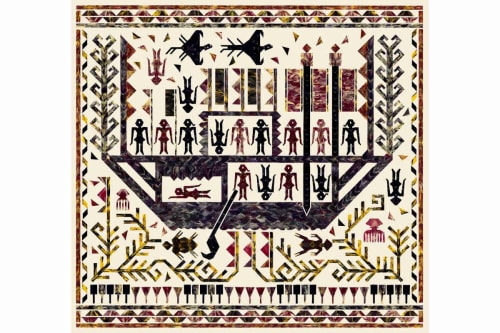Investigating her Chinese-Indonesian ancestry, Jenifer Tee creates works that address complex topics of cultural hybridity, identity, migration, colonialism, and human involvement with the cosmos and environment. Her art spans different mediums, from sculpture and installation to photography and collage, and materials, including the use of pressed tulip petals for her Tampan Tulips series.
The first solo exhibition of Tee's work arrives at Tina Kim Gallery in New York later this month. Titled Ancestral Beginning, Sessile Beings, it will be the artist's first solo presentation in New York, following her recent exhibition at Kunstinstituut Melly, which was co-produced with Secession.
The show is an excellent opportunity to explore Tee's wide-ranging practice and learn more about the artist who draws intricate connections between material histories and memories spanning different places and time horizons.
The Soul in Limbo
The phrase, 'the soul in limbo,' taken from André Breton's 1928 surrealist novel Nadja, can best define works Jennifer Tee has created over the years. While she examines the material traces of the history of migration and colonialism, inherent to these considerations is the relationship between the material and spiritual. Tee's work encompasses the idea of what is alive but restless and caught in between. While the in-betweenness allows contemplation on cross-cultural identity, loss of language, and tradition, it also gives valance to spiritual realms beyond essentializations.
Modernist in its approach, Tee's work honours the lineage of artists inspired by spiritualism, such as Hilma af Klint, as well as the artist's ancestry.
Ancestral Beginnings, Sessile Beings
The exhibition will feature different series of works, including Tee's hand-knit floor pieces, pineapple cloth tapestries, and ceramics. The exhibit's centerpiece, however, will be her Tampan Tulips, which is part of a seasonal serial work the artist has developed for nearly a decade.
The series is made from pressed tulip petals, combined to form the motifs from the Tampan, square-shaped woven cloths that were used in important rites of passage. The cloths originate from the Lampung region of southern Sumatra, which has been a crucial trade route since antiquity.
The most common motifs are ships with masts branching into trees, evocative of human souls moving to new lives. Ships as a reference to migration are also of personal interest to artists whose father migrated with his family to the Netherlands from Indonesia on a ship in the 1950s.
The crux of the Tampan series is based on natural cycles, which define harvest and yields. Besides petals, Tee also uses piezographies, the scans of petal collages, which are akin to messages from another world for Tee.
Jennifer Tee at Tina Kim Gallery
While evoking ideas of migration, Jennifer Tee exceeds that notion in the forthcoming exhibition as she redefines humanity's place in the greater scheme of things. Instead of constant flux, she suggests another stance, sessile and immovable, embedded within ecological time.
The exhibition Jennifer Tee: Ancestral Beginnings, Sessile Beings will be on view at the Tina Kim Gallery in New York from February 15th until March 16th, 2024.


